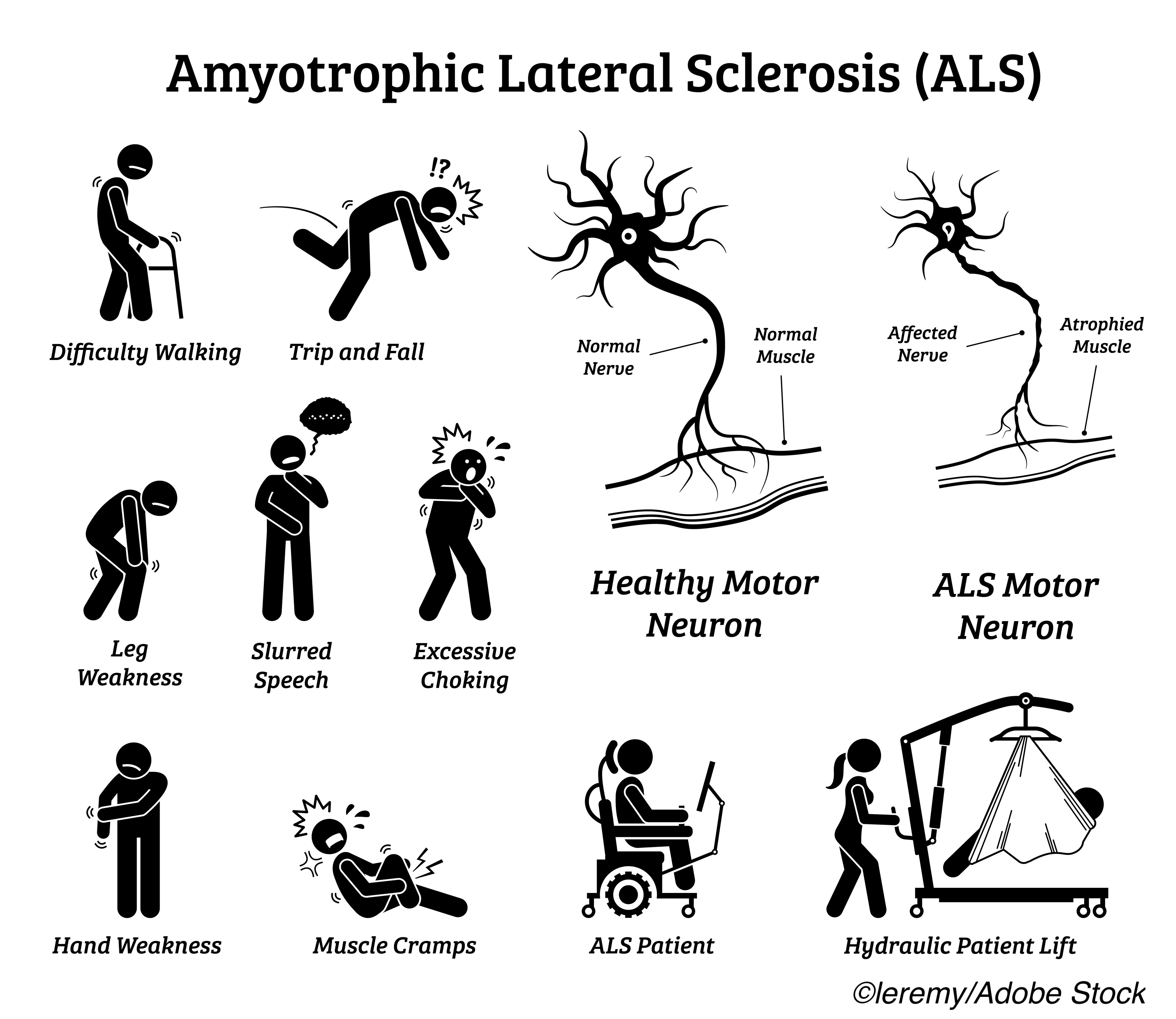The tumor protein p73 gene (TP73) was associated with amyotrophic lateral sclerosis (ALS), a gene sequencing study showed.
“We show that rare, nonsynonymous mutations identified in TP73 among spontaneous ALS patients have a deleterious effect on protein function and that p73 is necessary for motor neuron health,” wrote Kristi Russell, BS, and Lynn Jorde, PhD, both of the University of Utah in Salt Lake City, and co-authors, in Neurology.
“Future studies could investigate whether the apoptotic pathway could become a suitable target for novel therapeutic intervention during motor neuron degeneration,” they added.
“Much remains unknown about the genetics and processes that lead to the development of ALS,” Jorde said in a statement. “While known gene variants are critical determinants of 68% of familial ALS cases, they only account for 17% of sporadic ALS, yet up to 61% of sporadic ALS is believed to be influenced by genetic factors.”
He added: “Our study has identified a new genetic risk factor for sporadic ALS, rare mutations in the gene TP73. We also found that mutations of this gene have a damaging effect on protein function and that the protein created by this gene is necessary for nerve cell health.”
TP73 encodes a transcription factor required to prevent neuronal apoptosis that is also involved in developmental and stress responses and binds to the tumor suppressor gene (TP53) protein product. Protein products for TP73 and TP53 are designated p73 and p53, respectively.
In this study, the researchers examined exome sequencing in 87 patients with sporadic ALS and found five heterozygous mutations in the TP73 gene. Study of additional cohorts discovered 19 additional variants, with a distribution of 22 heterozygous point mutations and two in frame deletions in 2,940 patients overall.
No mutations of TP73 were seen in a control group (n=324). Patients in all cohorts did not display close relatedness or family history of ALS.
In other analyses, the researchers found that immunoprecipitation of the mutant protein in a murine neuroblastoma cell line showed impaired ability of p73 to bind p53. Myoblast differentiation assay with murine C2C12 cell line showed abnormal differentiation and increased apoptosis. Gene knockout in zebrafish led to impaired motor neuron development, lower numbers of motor neurons, abnormal axons with reduced branching, and loss of spinal motor neurons due to apoptotic death.
“Our results show that deleterious TP73 protein-coding variants occur in ALS patients at a total frequency similar to that of other known ALS risk genes, that TP73 ALS variants impair normal function of p73 in both C2C12 and neuroblastoma cell lines, and that loss of p73 impedes motor neuron survival and axonal development in vivo,” the researchers wrote.
In an accompanying editorial, Peter Hedera, MD, PhD, of the University of Louisville in Kentucky, wrote that the study is “a seminal discovery in the genetics of ALS,” and includes “robust evidence of impaired function of mutant protein using in vitro and in vivo assays, making very convincing arguments that TP73 is the causative gene.”
“The most intriguing data include reduced interaction of mutant p73 protein with its binding partner p53, suggesting that motor neurons expressing abnormal p73 may be potentially more vulnerable to apoptosis upon cellular stress,” he added.
“Even though impaired apoptotic pathways have been indirectly postulated as a consequence of mutations in several ALS genes, including SOD1, the identification of the TP73 gene as a cause of ALS directly links genetic changes with the programmed cell death,” Hedera continued. “This further supports the hypothesis that apoptotic pathways could have a more important role in the origin and progression of ALS than previously thought.”
More than 50 potentially causative or disease modifying genes had been associated with ALS by the publication of a 2019 review of ALS genetics and therapies, and each addition, in theory, might lead to disease-modifying therapy.
Russell and colleagues identified and ranked TP73 variants with the Variant Annotation Analysis and Search Tool (VAAST) which uses amino acid substitution and allele-frequency information to find and prioritize genes with harmful alleles. Candidate genes identified were then ranked using Phevor, which uses a complementary strategy integrating phenotype, gene function, and disease information to highlight likely pathologic mutations.
The only gene to rank among the top five genes in both VAAST and Phevor was TP73, which became the focus of the study.
“Targeting of p73 has been already explored in oncologic disorders and several potential therapeutic interventions are tested,” Hedera wrote. “We can hope that the association of TP73 with ALS also opens new approaches, leading to novel therapies for this devastating disease.”
Limitations of the study include the need for independent confirmation and additional insight into disease mechanisms.
“Transcription factors that drive neuronal cell survival, differentiation, and tumor suppressor pathways have not been extensively studied in ALS,” the researchers noted. “These findings reveal unexpected aspects of ALS genetic risk and pathology and may identify new approaches to treatment.”
-
The tumor protein p73 gene (TP73) was associated with amyotrophic lateral sclerosis (ALS), a gene sequencing study showed.
-
Regulation of apoptosis may have an unexpected role in contributing to ALS pathology. Future studies will determine whether the apoptotic pathway could become a target for effective therapy.
Paul Smyth, MD, Contributing Writer, BreakingMED™
The study was supported by the National Institutes of Health and Target ALS.
Jorde reported receiving royalties from Elsevier.
Hedera reported no disclosures.
Cat ID: 130
Topic ID: 82,130,730,130,192,925



